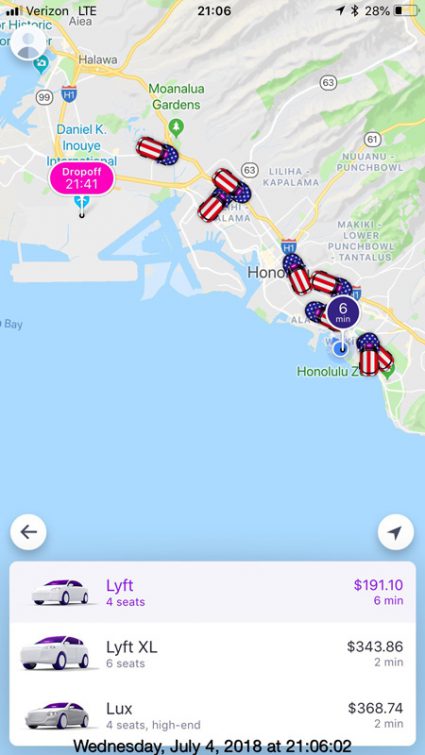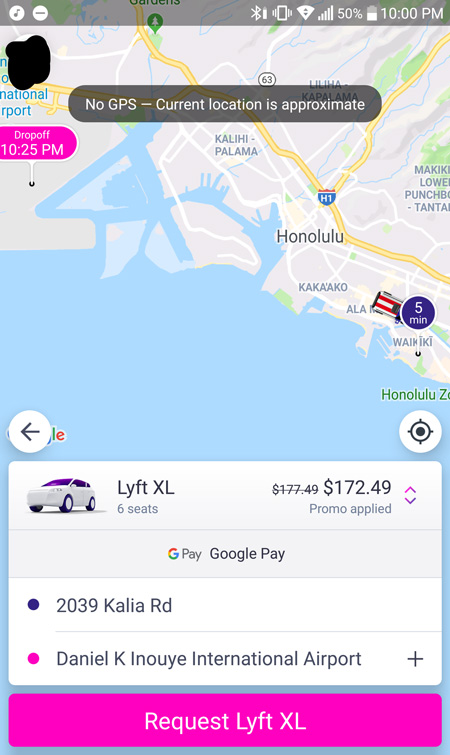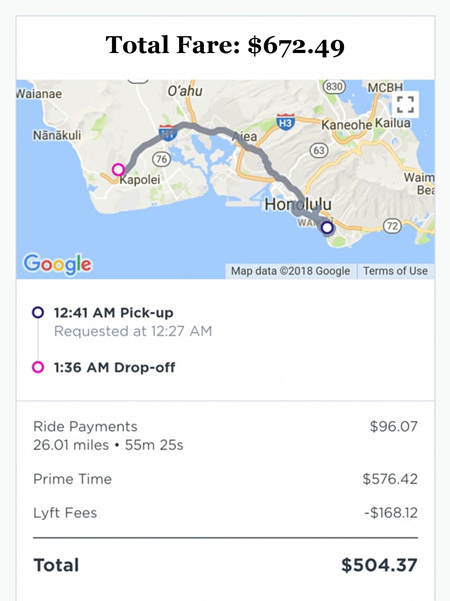
Safer Tourism seal
Charley’s Taxi was recognized by Resilience Travel for its high standards and commitment to safety on August 17, 2020. In these incredibly difficult times for everyone and every sector of our economy, the travel industry must do its utmost to safeguard all aspects of the traveling experience. And of course we need to demonstrate our commitment to safety to our customers. It is for that reason that we are honored to be recognized for our efforts with the Safer Tourism Seal.
Safer Tourism safety and security experts evaluated Charley’s Taxi and found the company to be a model for transportation and taxi businesses. The Safer Tourism seal takes into account a company’s customer service and safety protocols and how those have adapted to the COVID-19 pandemic.
Honolulu transportation regulation
The City of Honolulu has steadily eroded basic consumer protections in the transportation for hire industry in the past four years.
We believe that requirements like biometric (fingerprint) background checks, insurance, and medical certification are important consumer safeguards that should be restored to law immediately. The Mayor and City Council disagree and have scrapped such protections.
Here’s the short story. For more information, please read on past this table.
| PAST | CURRENT | CONSEQUENCE |
| Fingerprint background check. | Name-based check only. | Biometric catches disqualifying criminal offenses, name checks do not. |
| Strictly regulated rates. | Taxis are regulated. Uber and Lyft are free to charge whatever they want. | Price gouging (aka “Surge Pricing”). |
| Verification of Commercial Insurance Policy. | No verification. | No one knows if a driver is properly insured. |
| Medical certification of fitness to drive. | No medical certification. | Anyone with a license can drive for hire, including those with medical conditions that pose a risk to passengers and the public. |
Next on the City’s chopping block? Repealing rules that require for hire drivers to take the shortest route and to operate a clean and safe vehicle. The City would also allow drivers to take kickbacks and refuse trips with no justification.
| CURRENT | IF REPEALED |
| Driver must take shortest route. | Take the scenic route, defrauding passengers. Visitors and highly intoxicated people are most vulnerable. |
| Illegal: trip refusal for “orderly” persons within 2 miles. | Driver can refuse anyone with no justification. Enables discrimination (short trips, underserved populations) |
| Taxis can charge a range of rates below city mandated maximum | Taxis forced to set a single rate, preventing innovation, discounts, and special offers. |
| Requires up front, all-in rate agreed to by passenger pre trip | Incentive to price gouge when supply is scarce. During over supply, will lead to bargaining and bidding war. Odometer and time based fare calculation is a long-established standard most fair to driver and passenger. |
If you believe in common sense consumer protections, please contact the Mayor and your City Councilmember. We need your help to show the City that Uber and Lyft do not speak for all of Honolulu. A short comment, which you can use to contact the Mayor and your Councilmember, along with contact information, is available here:
Take ActionFollowing is more detailed information about the threats Honolulu faces as the Mayor and City Council continue redefining the lowest common denominator in our transportation for hire industry.
Did your driver pass a fingerprint background check?
If you’re riding with Charley’s Taxi, yes. We have maintained our high standards despite the repeal of a fingerprinting requirement.
With other taxi companies, the answer is most likely,“no.” In an Uber or Lyft, the answer is definitely, “no.”
Is that a big deal? We think it is. Simple name-based checks miss all kinds of important information, even records of violent crimes and sexual assault. When Massachusetts implemented fingerprint background checks in 2017 for all “for hire” drivers, about 11% (8,206 of 71,000) of those already driving for Uber and Lyft failed. Serious offenses uncovered by fingerprinting, and missed by the previous name-based checks, “range from license suspensions to violent crimes and sexual offenses.”
More than 8,000 drivers for ride-hailing companies such as Uber and Lyft have been pulled off Massachusetts roads after failing a new state background check, for infractions that range from license suspensions to violent crimes and sexual offenses, according to records released Wednesday.
The state reviewed the criminal and driving records of nearly 71,000 drivers who had already passed reviews by the companies, and rejected 8,206 — about 11 percent.
Hundreds were disqualified for having serious crimes on their record, including violent or sexual offenses, and others for driving-related offenses, such as drunken driving or reckless driving, according to the state Department of Public Utilities.
The agency said it rejected 51 applications from sex offenders and 352 for incidents related to “Sex, Abuse, and Exploitation.”
In addition to fingerprinting, Charley’s Taxi conducts an FBI background check and requires INS work authorization.
Do you love surge pricing?
The Mayor and City Council think you do. Taxi rates are regulated by the City for the protection of consumers, but Uber and Lyft remain free to charge whatever they think passengers will pay.
Once upon a time, price gouging was not only frowned upon but also strictly prohibited.
Today it’s fair game. On the evening of July 4, 2018, Uber and Lyft rates “surged” to stratospheric heights. At 9:06 that night (top/left screenshot), Lyft quoted an 8-mile ride from Hilton Hawaiian Village to the Airport at $191.10 for 4 passengers and $343.86 for 6 passengers. The city regulated taximeter rate, regardless of passenger capacity, is usually between $35 and $38.

Nearly an hour later (bottom/right screenshot), at 10pm, the rate for a 6-passenger vehicle was still at $177.49.
That’s just one recent example of price gouging. Lyft driver receipts show that surge pricing is especially predatory late at night when people who want to drink responsibly can face a $672.49 charge for a 55-minute ride of 26 miles.
Should your driver take the scenic route?
The Mayor’s bill says, “go for it” by repealing the following language:
No operator of a taxicab may transport a passenger except to the requested trip destination by the most direct or economical route unless specifically instructed or agreed to by the passenger. (ROH Sec. 12-1.21 Ord. 88-98)
Why undo the simplest, fairest way to calculate fares?
The Mayor’s bill would require passengers to accept a pre-determined, “all-in” fare before starting the trip. This needlessly complicated scheme creates a host of problems.
When supply is scarce, drivers could inflate the all-in fare to whatever they think someone with no other options will pay. During over-supply passengers can shop around among drivers for the lowest fare, the polar opposite of the efficient marketplace Uber and Lyft claim to provide.
What could be simpler than calculating the fare based on miles driven and time elapsed? A ride with no traffic costs a simple per mile rate. If there’s bad traffic, a time charge kicks in to more fairly compensate the driver for the use of the vehicle. Taxi odometers have done this for decades and “soft” meters (app-based) do it as well.
Predatory Pricing, aka “dumping.”
So far not addressed in the media or by the City Council is the fact that fares only cover about 41% of Uber’s operating costs. Isn’t profit the ultimate goal of any corporation? Why would any company sell its services so far below actual costs? Turns out when investors are throwing money at you, billions of dollars every year, you can afford to lose money on your main business operations. And why do that? To kill the competition, hence “predatory pricing.”
Uber passengers were paying only 41% of the actual cost of their trips; Uber was using these massive subsidies to undercut the fares and provide more capacity than the competitors who had to cover 100% of their costs out of passenger fares.
The logical conclusion is this: once the competition has been decimated Uber will have a monopoly in the passenger transportation for hire market. And one doesn’t need a degree in economics or history to know what will happen to those cheap fares everyone loves.
Who benefits from repealing “Trip Refusal” rules?
Not passengers. New bills would allow drivers to refuse anyone with no justification. For decades, drivers have been required to serve anyone who is “orderly and within 2 miles.” Drivers were allowed to refuse service only if a passenger was a threat to the safety of the driver and the public, aka “disorderly.”
What’s the problem with repealing that? Drivers will be able to refuse service to passengers who just need a short ride. This repeal would also make it much easier for drivers to discriminate against underserved areas and populations by refusing trips to certain neighborhoods.
Does your driver have insurance that covers driving for hire?
Again, the answer is most likely “no.” While an add-on policy is available, the City does not require Uber/Lyft drivers to show proof of this extra coverage. Because the right coverage costs extra and there is no enforcement the odds are high that Uber/Lyft drivers are not covered during the “gap” period when they’re cruising for passengers. This puts everyone at risk because if a driver gets into an accident during this highly distracted gap period any victims will not have recourse to an insurance claim.
If such an accident should occur on City or State property, a victim’s best legal option is to sue the City or State for their negligence in enforcing insurance requirements. That puts the financial burden on all of us.
Charley’s Taxi drivers are insured at double the coverage as compared to the incomplete insurance provided by Uber and Lyft.
Is your driver medically fit to drive?
Charley’s Taxi drivers must still be certified by a Hawaii-licensed doctor. Other taxi drivers are now free to skip this important safety certification. Uber/Lyft drivers were never required to follow this rule.
Are you seeing a pattern? The City has dropped the previously required basic physical test designed to evaluate a driver’s fitness to drive. All that’s required now is a driver’s license. For hire drivers not only do a lot more driving than average, they should also be able to perform basic duties like helping passengers load luggage, or helping passenger enter and exit a vehicle.
According to this Driver Qualification and Training Personnel Manual (PDF), it appears that the City does understand the value of insurance, medical certification, training, and testing. Yet fingerprinting, insurance, and medical certification have been scrapped. These were all once part of Honolulu’s commitment to safety and service.
The City’s abdication on transportation for hire regulations goes beyond safety. Long-standing rules governing trip-refusal, shortest route, and maximum distance and time rates ensured consumers could trust they were paying a fair rate. The new bills being considered represent a race to the lowest common denominator, not a level playing field.

